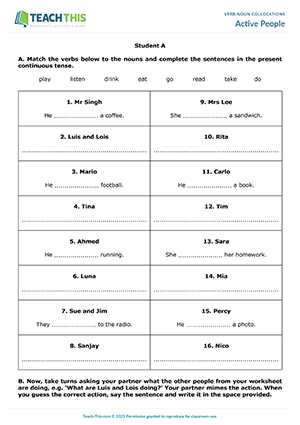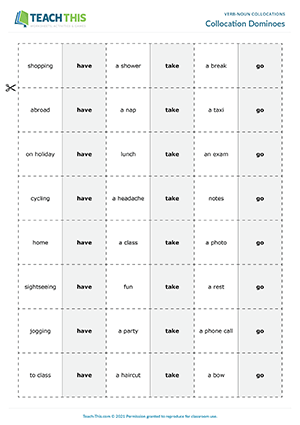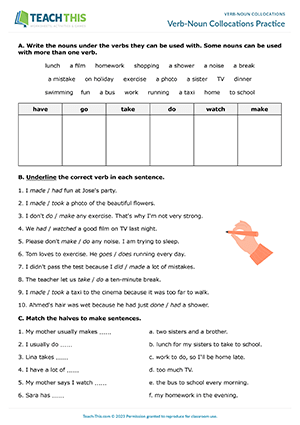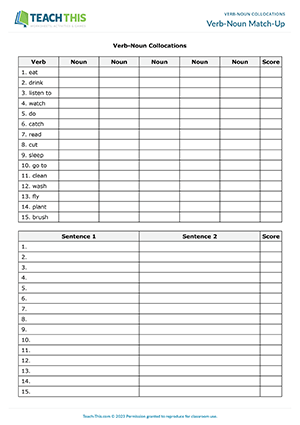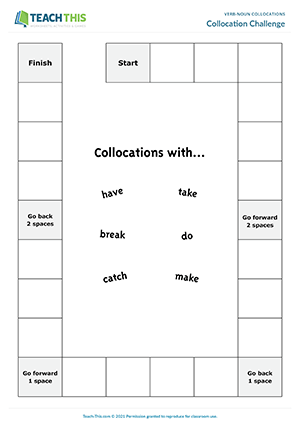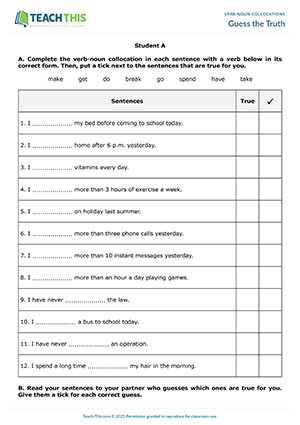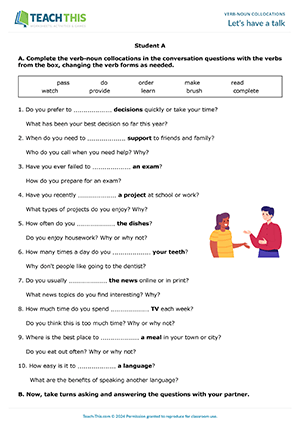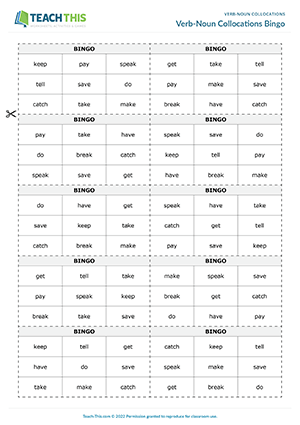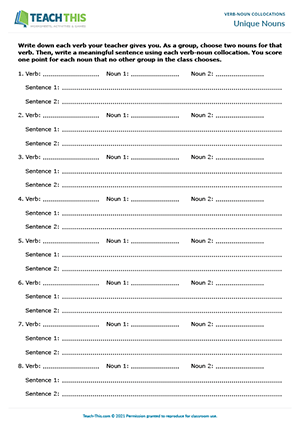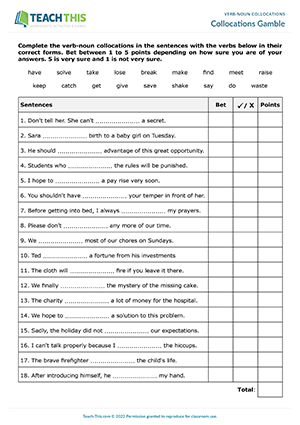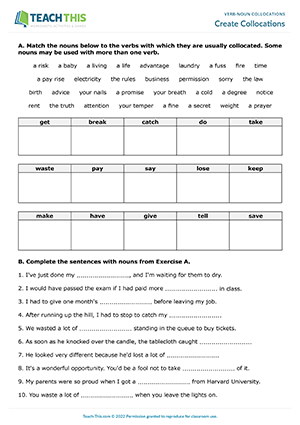Here is an enjoyable verb-noun collocations information gap activity to help students practice common verb-noun collocations and the present continuous. First, in two groups, students complete sentences by matching verbs to nouns and forming sentences in the present continuous tense. Next, students pair up with someone from the other group and take turns asking their partner what the other people from their worksheet are doing, e.g. 'What is Lucy doing?' or 'What are Peter and Paul doing?' Their partner mimes the action, and the other student tries to guess what they are doing. When the student guesses the correct action, they make a present continuous sentence and write it in the space provided, e.g. 'She is eating pizza.' or 'They are playing basketball.' The first pair to finish wins.
In this productive verb-noun collocations game, students play dominoes by making present simple sentences with have, take and go collocations. The first player makes a verb-noun collocation by placing one of their dominoes at either end of the domino on the table. If the player successfully makes a verb-noun collocation, they say a true present simple sentence with the collocation, e.g. 'I have a shower every morning'. The other group members judge the player's sentence. If the sentence is grammatically correct, the student leaves the domino where it is. If the sentence is wrong, the player picks up the domino and keeps it. The next player then tries to put down one of their dominoes at either end of the domino chain and so on. The first player to get rid of all their dominoes wins the game.
This useful verb-noun collocations worksheet helps students practice common collocations with have, go, take, do, watch and make. First, students categorise nouns according to the verbs they can be used with. Students then underline the correct verb in each sentence. Next, students match halves to make sentences. After that, students complete sentences with verbs in the present or past simple. Students then complete conversation questions with nouns from a box. Lastly, students take turns asking and answering the questions with a partner.
This two-part verb-noun collocations game helps students practice 15 verbs and their possible verb-noun collocations. First, in pairs, students play a pelmanism game where they take turns turning over one verb card and one noun card. If the verb and noun match to form a logical verb-noun collocation, the student scores a point and keeps the cards. For an extra point, the student then tries to make a sentence with the verb-noun collocation. If the cards don't match, the student turns them back over, keeping them in the same place. The student with the most points at the end of the game wins. Next, pairs have ten minutes to brainstorm and write up to five other nouns that can be used with each verb from the first game, scoring one point for each suitable verb-noun collocation. After that, pairs have another ten minutes to choose two nouns for each verb and write two sentences using the verb-noun collocations. Pairs score one point for each sentence that uses the collocation correctly and one point for a grammatically correct sentence. The pair with the most points at the end of the game is the winner.
This fun verb-noun collocations board game helps students to practice verb-noun collocations with have, take, break, do, catch and make. Students take it in turns to pick up a card and read the gap-fill sentence on the card to the other students, e.g. 'If you're sick, you should BLANK some medicine'. The other students then race to repeat the sentence back to the reader, adding in the correct verb to complete the verb-noun collocation in the sentence. The first student to complete the sentence correctly wins. The winner then rolls the dice and moves their counter along the board accordingly. The first student to reach the finish wins the game.
In this amusing verb-noun collocations game, students complete verb-noun collocations in sentences and then guess which sentences are true for their partner. Working alone, students complete the verb-noun collocation in each sentence on their worksheet with a verb in its correct form. Students then put a tick next to the sentences that are true for them. Next, students take turns reading their sentences to their partner who guesses if they are true or not. For each correct guess their partner makes, students put a tick in the last column. The student with the most correct guesses at the end wins.
In this insightful verb-noun collocations speaking activity, students complete, ask and answer conversation questions containing useful verb-noun collocations. First, in two groups, students complete verb-noun collocations in conversation questions with verbs from a box in their correct forms. Students then pair up with someone from the other group and take turns asking the conversation questions to their partner, who responds accordingly. For the first question in each set, students include the corresponding verb-noun collocation in their response. Afterwards, students share what they learned about their partner with the class.
In this free verb-noun collocations game, students play bingo by listening to gap-fill sentences and matching verbs with collocating nouns in sentences. Read a sentence at random from the caller's sheet, saying the word 'blank' for the missing collocating verb. Students listen and look at the verbs on their bingo cards to see if they have a verb that completes the verb-noun collocation in the sentence. If they do, they cross it off. The game continues until a student has crossed off three verbs in a row. When this happens, the student shouts 'Bingo!' and reads out the verbs they crossed off. If they match the sentences that were ticked on the caller's sheet, the student wins the round. Students then start a new round or continue to see who can cross off all nine verbs. Play several rounds, making sure students receive a different bingo card each time. If you have a large class or you want to give the students more practice with verb-noun collocations, have the students play the game in groups of six with students taking it in turns to be the bingo caller.
This creative verb-noun collocations game helps students practice using a variety of different nouns with transitive verbs. Begin by assigning the class a transitive verb, e.g. play. In teams, students choose two nouns that can be used with the verb to make a collocation, such as 'play the trombone' and 'play snooker'. Teams should try to think of nouns that they think other teams won't choose. Teams then write a sentence that illustrates each verb-noun collocation, e.g. 'I play the trombone in the school band'. Teams score one point for each grammatically correct sentence that includes a unique noun that no other team has used. In other words, if two teams use 'play football', those teams don't score a point for that sentence. Play several rounds using a different transitive verb each time. The team with the most points at the end of the game wins.
In this engaging verb-noun collocations activity, students complete verb-noun collocations in sentences with verbs and then place bets on their answers. To start, students complete verb-noun collocations in sentences with the verbs provided in their correct forms. Students then bet between 1 to 5 points depending on how sure they are of their answers. 5 is very sure and 1 is not very sure. Next, elicit the correct answers from the students. For each correct answer, students put a tick and write the number they bet in the 'points' column. For each incorrect answer, students put a cross. In the 'points' column, they write a minus sign with the number they bet. Finally, students add up their points. The student with the most points is the winner.
This comprehensive verb-noun collocations worksheet helps students practice verb-noun collocations with get, break, catch, do, take, waste, pay, say, lose, keep, make, have, give, tell and save. To start, students match nouns to verbs with which they are usually collocated. Next, students complete sentences using the nouns. After that, students complete sentences with the verbs in their correct form. Students then match sentence halves to make sentences, adding a suitable verb in the correct form to each one. Lastly, students complete sentences with verb-noun collocations from the first exercise.
Latest Free
Resources
- Jigsaw Reading
Reading Exam Preparation (B1)
Date Added: 7th of March
- Writing Jeopardy
Writing Exam Preparation (B1)
Date Added: 6th of March
- Present Perfect Bingo
Present Perfect Yes No Questions (A2)
Date Added: 4th of March
- Count on Me!
Making Offers and Promises (A2)
Date Added: 11th of February
- It’s Carnival Time!
Cultural Celebrations (B1)
Date Added: 29th of January
Latest Member
Resources
- Shops and What They Sell
Shopping (B1)
Date Added: 12th of March
- Who has written this?
Present Perfect Yes No Questions (A2)
Date Added: 11th of March
- Business Greetings and Introductions
Networking (B2)
Date Added: 11th of March
- Have you done this?
Present Perfect Yes No Questions (A2)
Date Added: 7th of March
- True, False or Not Given
Reading Exam Preparation (B2)
Date Added: 7th of March



